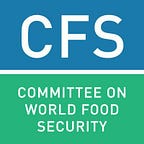CFS 44–44th Session of the Committee on World Food Security
If Einstein had been a farmer
In a world of climate change, food insecurity and rapid urbanization, just try to imagine for a few minutes what Albert Einstein would be doing if he were a young farmer nowadays. Considering that obviously, the world has dramatically changed over the last 100 years since the “Theory of relativity” was developed.
“What do today’s young agricultural leaders need, to meet tomorrow’s SDG challenges?”, was the name of the 2nd side event I attended during the CFS44. Can we young people really become the generation that ended hunger, poverty and brought sustainable development leaving no one behind? (As the 2030 Agenda states)
Yes, youth can do it!
Today in the plenary session Mr. António Guterres, Secretary-General of the United Nations said: “We have the tools and the commitment to end hunger”. I couldn’t agree more with that. Today, we not only have the commitment of the 193 Member States of the United Nations that signed the 2030 Agenda, but also the tools to make it real. Tools like the ones that are helping young entrepreneurs to reshape the world, tools that Einstein didn’t have in his times.
Can you imagine Einstein, the young farmer, using the tools big companies like Google or Facebook are using now? Innovative tools that help entrepreneurs to create Ubers, AirBnbs, Amazons, WhatsApps, etc? Or maybe using FinTechs to solve his financial problems or “Design Thinking” to find new approaches for Human Centered Design?
I don’t think Einstein, the farmer, would have created the “Theory of relativity”, but maybe the next billion dollar idea on how to change the way we produce, deliver and consume food. Yes, I imagine Einstein, as a young entrepreneur changing the way we eat, while achieving the SDGs at the same time.
Wouldn’t you agree with Einstein when he said: “We can’t solve problems by using the same kind of thinking we used when we created them”?
In this side event, we explore what challenges and needs young farmers are facing all around the world: market barriers, lack of funding, environmental issues, and some more; areas the 193 UN Member States have already committed themselves to. And I found myself wondering, are we really thinking differently?
Yes, we need support, but c’mon, we young people also need to use our energy, creativity, determination and passion to transform the world, to Transform OUR world. (As the 2030 Agenda also states). These problems we now face can also become opportunities to create new and disruptive initiatives, don’t you think?
Let’s go back to Einstein, the young farmer. He is working on his new idea that’s going to change the way we eat (his “Theory of Relativity), but no one is listening him as we all are thinking how to bring more young people into farming (the traditional physics trying to solve the “Theory of Relativity” with classical physics, or by 19th century physics). Get what I’m saying now?
We need to support the young farmers, but we also need to support the young people trying to create new things that are going to solve problems related with food and agriculture. We need to strengthen their entrepreneurial ecosystems worldwide by creating high risk investment programs, implementing incubators/accelerators focused on Food&Agro, etc.
Let’s unleash the next generation of agri-food changemakers and let’s make things fall by their own weight.
This blogpost is based on the CFS44 side event “What do today’s young agricultural leaders need, to meet tomorrow’s SDG challenges?”
Blogpost by Diego Valencia, #CFS44 Social Reporter — diegokuchara(at)gmail.com
Photo Credit: U.S. Department of Agriculture on Flickr
This post is part of the live coverage during the 44rd Session of the Committee on World Food Security, a social media project supported by GFAR. This post is written by one of our social reporters, and represents the author’s views only.
Originally published at www.fao.org.
